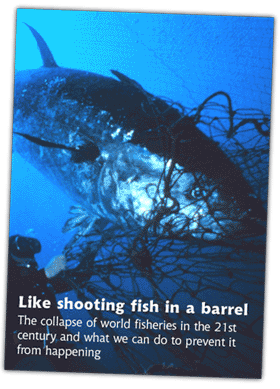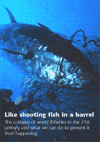Like shooting fish in a barrel: What we can do to prevent the collapse of world fisheries
 Written in 2005, this report outlines the health pros and cons of eating fish, summarises the environmental damage caused by both industrial fishing and fish farming, and lays bare the contradictions in government policy at both UK and EU level.
Written in 2005, this report outlines the health pros and cons of eating fish, summarises the environmental damage caused by both industrial fishing and fish farming, and lays bare the contradictions in government policy at both UK and EU level.
Scientists are increasingly aware of just how little is known about how the marine environment functions. The grand scale, which has always created the impression of limitlessness, has coloured what humans expect from the sea. Until the last two centuries, it may well have been true that human activity was not significant enough to affect the resilience of marine life, but there is undeniable evidence that humans are now a serious threat to the survival of many marine species.
Fishing is the human activity most damaging to the seas, and only global-warming can match fishing in terms of the scale of the harm to the oceans. Fishing has been transformed from a local industry that supports coastal communities, into an exponentially larger industrial operation, complete with startling quantities of waste, pollution, and disregard for environmental effects. This problem has been able to reach such a crisis point due to the invisibility of the effects. Until fish populations become extinct, there is no obvious signal of what is going on. Since current scientific research now allows us to know more about the extent of the problem, it is time to accept the facts and work to preserve what life remains beneath the waves. The seas are the largest commons in the world and, without adequate and enforced regulation, this may result in the world's largest tragedy of the commons.
Progress update (2011): Since this report, Sustain has developed policy and project work to help play our part in preventing the collapse of world fisheries. We are working to change the demand for fish, to make sure that retailers and caterers in a strong position to influence fisheries use their buying power to do so. This work includes work to:
-- secure sustainable fish pledges from restaurants, chefs and caterers through the Sustainable Fish City campaign, and from the London 2012 Olympic and Paralympic Games
-- help public sector organisations adopt sustainable fish buying policies through the Good Food on the Public Plate project, and to mandate this in legislation through the Good Food for Our Money and Campaign for Better Hospital Food
-- support restaurants and caterers in London to learn how to buy and serve sustainable fish through the Food Legacy project and the Ethical Eats network
Report contents
1) The boundless oceans?
- Over-fishing is the culprit
2) Fish and health
- Omega-3 fatty acids
- Omega-3s - hold the anchovies?
- Pollution in the fish we eat
- Special advice for pregnant women
- Look at the label
- Marine Stewardship Council labelling
- Organically farmed fish
3) Fishing and the marine environment
- Declining stocks
- Ocean ecology
- Ghost fishing
- National Parks in the sea?
4) Fish farming
- Green around the gills
- Feeding farmed fish
- Fish farms and environmental damage
- Wildlife under threat
- The impact of farmed fish on wild populations
- Sustainability on a half shell
- Prawns and mangroves
5) Jobs in the fishing industry
6) The European Union Common Fisheries Policy
- The TAC system
- Improving EU policies
- Fishing in foreign waters
7) What can you do?
- Want to get political?
- A guide to healthy and sustainable fish
Where to go for more information
Useful organisations
Recommended reading
References

Like shooting fish in a barrel: What we can do to prevent the collapse of world fisheries
ISBN: 1-903060-38-9- 32pp - 2005 | 1945Kb
Published Sunday 31 July 2005
Food Facts: A series of short reports on over a dozen different products, shows how people's shopping choices - as well as government policy - can protect the environment, enhance social justice and improve health.